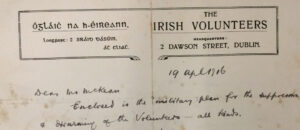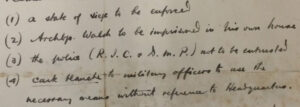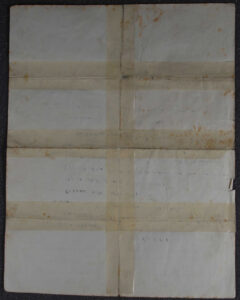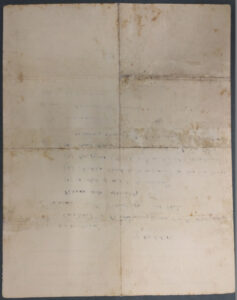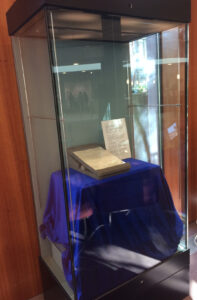Eoin MacNeill: Easter Rising 1916
- Emer Twomey
- April 19, 2016
Earlier this year a handwritten letter by Commander Eoin MacNeill (Chief-of-Staff of the Irish Volunteers) was donated to UCC Library.
This letter, dated 19th April 1916, signed by MacNeill and addressed to Mrs. McKean, was a cover letter to an enclosed military plan “for the suppression and disarming of the Volunteers” prepared by the British Government. This plan, later known as the ‘Castle Document’, was a fake document created by the organisers of the Easter Rising 1916 to convince those who needed convincing e.g. Eoin MacNeill, to rally the Volunteers throughout the country for an organised rebellion.
MacNeill notes specially in the letter the plan mentions that “a state of siege to be enforced, Archbp. Walsh to be imprisoned in his own house, the police (R.I.C. & D.M.P) not be entrusted and carte blanche to military officers to use the necessary means without reference to Headquarters”.
MacNeill knows “the Government will not allow this to be published” so it must “be circulated in the country as widely as possible”.
Gabriel Doherty, School of History, UCC commenting on the letter said: “the letter from Eoin MacNeill is significant because it indicates that, on the date in question, he sincerely believed in the authenticity of the ‘Castle Document’.”
When asked why the ‘Castle Document’ was created in the first place, he explained that MacNeill as Chief-of-Staff , who wasn’t a republican in the Irish Republican Brotherhood (IRB) mould, was in a position to frustrate the plans of the Military Council. Those involved in the planning, most particularly Plunkett, sought to overcome MacNeill’s scruples about the use of force by the Volunteers by in effect saying that the British were about to use force against them. Rallying the Volunteers would be morally and politically justified as an act of self-defence, in essence, the conditions laid down for armed actions by the Volunteers had been met.
Later in Easter week 1916 MacNeill learnt that the ‘Castle Document’ was not authentic and he countermanded his original call to arms, as published in newspapers on Easter Sunday.
The letter came to the library in a relatively good condition, given its age. There was tears along the edges and folds, with some spotting and staining, all of which would be expected for a 100 year old document. It was obvious that it had been folded many times in its past and adhesive tape secured the back of the letter to ‘strengthen’ these folds. This tape was in the process of naturally aging.
It was decided to have the letter conserved i.e. removal of the adhesive tape and the letter cleaned, with any tears mended. This was done professionally by Paul Curtis, Conservator, Mucros Bindery, Muckross House, Killarney.
The MacNeill letter is on display in the foyer of the Boole Library, University College Cork, until the end of April. All are welcome to visit during the opening hours of the library – please check the calendar on library webpage .
The letter can be ordered for research by appointment from UCC Library Archives Service by emailing specialcollectionsarchives@ucc.ie.
UCC Library would like to thank the donor, who wishes to remain anonymous, for the generosity shown in donating this piece of Irish history to University College Cork, thus allowing it to be made available to the public.
